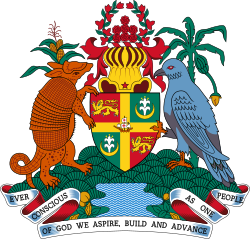| |||||||||||||||||||||||||||||||||||||||||||||||||||||||||||||||||
All 15 seats in the House of Representatives 8 seats needed for a majority | |||||||||||||||||||||||||||||||||||||||||||||||||||||||||||||||||
|---|---|---|---|---|---|---|---|---|---|---|---|---|---|---|---|---|---|---|---|---|---|---|---|---|---|---|---|---|---|---|---|---|---|---|---|---|---|---|---|---|---|---|---|---|---|---|---|---|---|---|---|---|---|---|---|---|---|---|---|---|---|---|---|---|---|
| Turnout | 68.42% | ||||||||||||||||||||||||||||||||||||||||||||||||||||||||||||||||
| |||||||||||||||||||||||||||||||||||||||||||||||||||||||||||||||||
 Winning party by constituency | |||||||||||||||||||||||||||||||||||||||||||||||||||||||||||||||||
| |||||||||||||||||||||||||||||||||||||||||||||||||||||||||||||||||
 |
|---|
| Administrative divisions (parishes) |
General elections were held in Grenada on 13 March 1990. [1] The result was a victory for the National Democratic Congress, which won seven of the 15 seats. Voter turnout was 68%. [2]



